HUNTERS
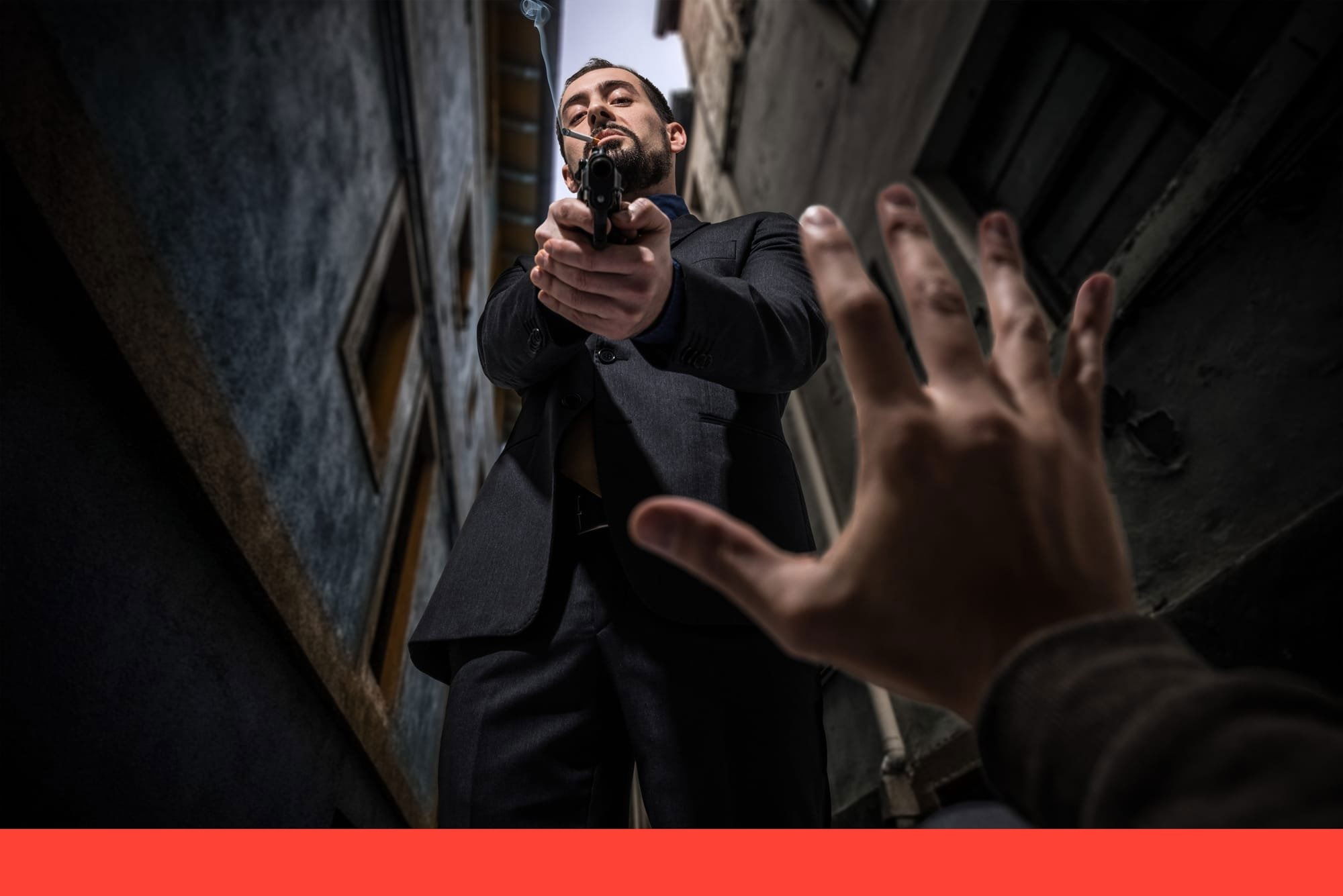
"There are things that go bump in the night...and we are the ones who bump back." Hellboy 2004
Source Material: Project Twilight, White Wolf; The Hunters Hunted, White Wolf; The Hunters Hunted II, White Wolf; Hunter Book: Judge, White Wolf
You Don't Live In The World You Thought You Did
You had a regular life before, with a job, perhaps a family and certainly your share of responsibilities. The things you cared about were everyday, even mundane. You would still live that life now, except you seem to have been chosen or forced to witness the reality of your world — that monsters exist, prowl the shadows and prey upon the unwitting — they prey upon what you used to be.
No matter how much they might want to, Hunters can never truly return to the life they once knew. Monsters are everywhere, and they seem to prey on humanity. The struggle overshadows everything else. Mere mortals are playthings, puppets and food - until they decide to fight back.
At first, normal humans try to forget or explain away what they’ve seen. Some resort to desperate measures such as drinking or taking drugs to deal with such a massive shift in their reality. Most suffer nightmares, bouts of paranoia or severe anxiety. The more they try to deny the existence of the supernatural, the more their minds tend to pick up odd details in the news or on the street. It’s not that monsters are invisible. They’re just adept at disguising their true natures, and most people aren’t alert enough to notice the small details that give them away. Unfortunately, you're now attuned to what those details are.
Because of all they've seen and learned of the supernatural creatures that exist alongside humanity, Hunters know one thing absolutely for sure: a single human is nothing but food. But you also know that a highly-trained group with a single purpose to eradicate monsters preying on humanity with laser precision is the only protection you and your team can offer in this fucked up world.
Where Does It End?
It doesn’t. Get used to it. It all comes down to choices about what’s important to you, how you make the hunt your own, and how you cope with all the victories and defeats along the way. Whether you make your past a part of your new life, or you abandon the past to embrace the new, your choice needs to give you strength on the hunt. After all, you can’t ignore the call. The question is, what’s the best answer for you? Because if checking out with a bullet in your head was the answer, you would have done that long ago. And if anything is true in this bullshit reality, you're a survivor!
Just to be perfectly clear, it's a thankless job protecting humanity from its invisible predators. The Hunters are often considered insane by normal humans and why wouldn't they think that? You certainly did before your eyes were opened.
A Hunter doesn't just protect his fellow humans from the physical threat of monsters, he protects them from the knowledge that they even exist. Because if they knew what you do, most of them wouldn't be able to survive than mental burden. And because of this, Hunters will spend as much time trying to evade imprisonment and mental institutions as in fighting their chosen enemies. The Hunter sacrifices peace of mind, position in society, and risks life and limb against the most dangerous prey: the Vampires, the Werewolves, and all the other supernatural threats that have yet to make themselves known.
What Do You Do Now?
At first, the recently awakened latch onto anyone who understands them; this new world is just too terrifying to contend with alone. And that's the smartest conclusion you can make. A lone vigilante doesn't stand a chance. In time, however, as more and more imbued dare meet and make overtures to find each other, individuals with similar attitudes and theories are attracted to one another and develop like-minded circles.
These foundling social groups are the bases for what ultimately become the Hunters. Yet, during the Hunters’ emergence, many varied imbued can seem to have common goals. As the chosen make contact, try to understand their mutual condition and strive to work together, similar goals and comparable experiences can hide fundamentally-different philosophies, whether about hunter purpose, the nature of the Messengers or the necessary fate of monsters.
All hunters agree that the supernatural’s hold on humanity must be broken, but not everyone agrees on how to accomplish this goal. Mutual experiences and mutual values turn out to be two very different things.
The Hunter's Motivation
No one takes up a dangerous and life-threatening calling without reason. A Hollywood stunt-man perhaps craves the thrill of danger. An infantryman could be answering the call to his sense of duty. A Hunter of the Supernatural must also have a reason for her/his/their madness.
A Hunter must have a motive, and it's important to build a backstory for your Hunter that delves into the person he "used to be" before the horrifying epiphany that monsters are real. This represents the reasons for his hunting, the cause perhaps of their long, dark night of the soul.
Motive also gives clues as to the goal of a hunter, whether it be destruction or questioning, torture or enslavement. Perhaps it's as direct as the drive to be a public defender, to protect those who are too weak to protect themselves, or to see justice done to those creatures who spit in the face of human laws. How can you say there isn't a personal stake in driving the monsters back to the Hell from which they came, instilling fear in those who dared try to make you afraid?
There are many different motivations for hunting the most terrifying creatures on Earth: revenge, hate, sense of duty, control, power, curiosity, thrill-seeking and insanity are just the most common. Upon Character generation, consider what your Character's personal motivations are for devoting his fragile mortal life in the pursuit of supernatural predators.
Path of True Faith
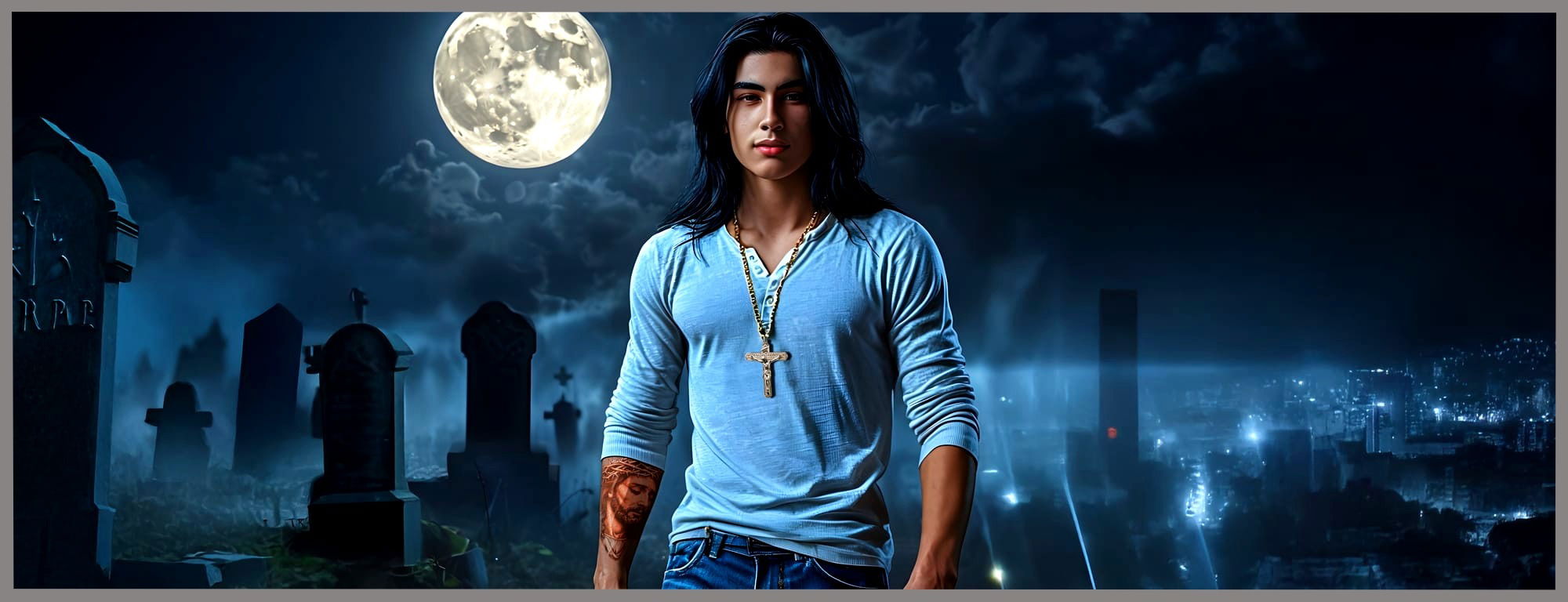
Description:
True Faith is a very personal and private matter for Hunters who have been blessed with this unwavering belief. It is not something they speak about casually or in an attempt to "convert" anyone else. You either have it from an early age, or you don't.
True Faith is not something one can learn or acquire, no matter how much someone prays, gives to the church, or reads religious texts. Hence, it is pointless to openly speak of it to others who would only accuse the Hunter of being an egotistical religious fanatic. All Catholic saints were holders of the True Faith. And how many of them met a peaceful death after a long and blissful life?
Hunters with True Faith look upon it as the divine shield of God for those who possess an unwavering belief in the protection of their deity from the corruption of evil. True Faith is not something that can be acquired later in life, it must be the foundation of a Character's upbringing in whichever religion the Hunter was born into. This is why it can only be acquired upon Character Creation for Judges and Survivors.
Psivivors begin Character Creation as Gifted Humans, and then only can become a Psivivor by experiencing a traumatic event where they are faced with the horrors of the supernatural world by exposure to either Vampires or Garou Werewolves.
(Only available during Survivor or Judge Character Creation.)
- NOTE: A Hunter with True Faith must be holding or wearing a PRIM symbol of their faith or a tattoo with religious meaning or symbolism (any organized faith, not just Christian faith) to benefit from the following bonuses. This can be in the form of jewelry, a belt, a Yamaka, permanent tattoo, or other worn or held pieces that represent the Hunter's faith.)
- Cost: 30 XP (during character creation only for Judges and Survivors)
- Permanent Affects:
- Cannot be Ghouled or Blood Bonded to Vampires
- Does not suffer Delirium upon seeing a Garou Werewolf or other supernatural creature
- True Faith believers receive the following benefits (this MUST be a prim item physically on your body or held or you forfeit the benefits of your True Faith):
- +20 Willpower
- +20 Mental Defense
- +10 Persuasion/Intimidation
- Turning away a Vampire or Undead with True Faith:
- When holding a symbol of the Hunter's True Faith in the face of a Vampire (or Vampires) or an Undead Creature (such as zombies, leches, abominos, skeletons, etc.), the Hunter must make their roll as a powerful demonstration of their True Faith.
- DIF: 80
- Energy: 10 points
- Mod: Willpower
- Resist: Willpower
- Botch: (Rolling a natural 1-10) The Vampire simply laughs at you and you cannot use True Faith on any Vampire for the duration of the scene.
- If the Vampire fails their roll to resist, he/she/they will Fox Frenzy and flee the scene. They will not be able to return for five full turns.
- If the Vampire returns, True Faith can again be used on them to turn them away.
- There is no limit on how many times True Faith can be used on a Vampire as long as the Character has enough Energy Points. (Let's face it, fighting off evil is exhausting!)
- When holding a symbol of the Hunter's True Faith in the face of a Vampire (or Vampires) or an Undead Creature (such as zombies, leches, abominos, skeletons, etc.), the Hunter must make their roll as a powerful demonstration of their True Faith.
The Blessings of True Faith
The blessings of True Faith are very rare. Devoted worshippers of every faith exist, but only a scant few have this robust holy connection. In Dominions of Darkness, this particular awareness of Faith is only available to Survivors and Judges.
Faith is a sacred trust in the divine, usually manifested in the form of a religion. Millions of people enrich their lives through this sacred trust, but only a blessed few have been personally touched by the divine...or have an unshakable belief that they are one of God's chosen warriors. True Faith is a combination of this trust and a divine favor that brings about a profound conviction that can protect an individual against the depredations of the evil, the corrupt, and the profane — such as the Kindred.
For Hunters, the nature of that force of good is determined by the believer and can manifest as the Christian God, Allah, Nature, Gaia, Isis, Bondye, or other deity of good (making devil or demon worship not available for True Faith). Official religious investments are not required to possess True Faith. Characters with True Faith are not required to be priests, rabbi, or clerics to possess this ability, though they may be. Indeed, many men of the cloth themselves aren’t so favored as to be able to be blessed by their god with True Faith.
True Faith and Vampires
Those with True Faith CANNOT be ghouled or blood bonded by Vampires. However, they CAN be embraced and turned into Vampires. This destroys the Character's True Faith and they no longer benefit from this path as Vampires. While they may still hold strongly to their religious beliefs, the transmutation from human to Vampire is traumatic enough that True Faith is no longer a certainty, but a disillusionment of the soul.
Once a character with True Faith becomes a Vampire, there is no longer an option for True Faith. Those who had True Faith as a purchased Ability will lose this option and cannot repurchase it once their XP is returned to reallocate to their new Vampire character.
About True Faith in Dominions of Darkness
- Those with True Faith can turn Vampires away with a display of both their faith and a physical/prim symbol of that faith.
- True Faith only be purchased/acquired during Character Creation by Survivors and Judges.
- Those who choose the Path of True Faith must wear or hold a prim that represents the source of their true faith in order for this blessing to work (Crucifix, Ankh, Star of David, Star and Crescent, Buddha, Om, etc.)
- True Faith is a defensive shield and cannot be used to attack/cause damage except to repel the undead.
- Unlike other skills/abilities/gifts, True Faith is purchased once. There are no levels.
- Those who wish to benefit from True Faith, must present this attribute while roleplaying the character. While it would be inappropriate to start "preaching" religion, it shouldn't be a total surprise to other Characters that your Character has True Faith. True Faith is deeply personal, cannot be taught, and is not the hallmark of someone looking to convert others.
- All undead and nearly all Vampires are affected by True Faith
HUNTER SPECIALISTS
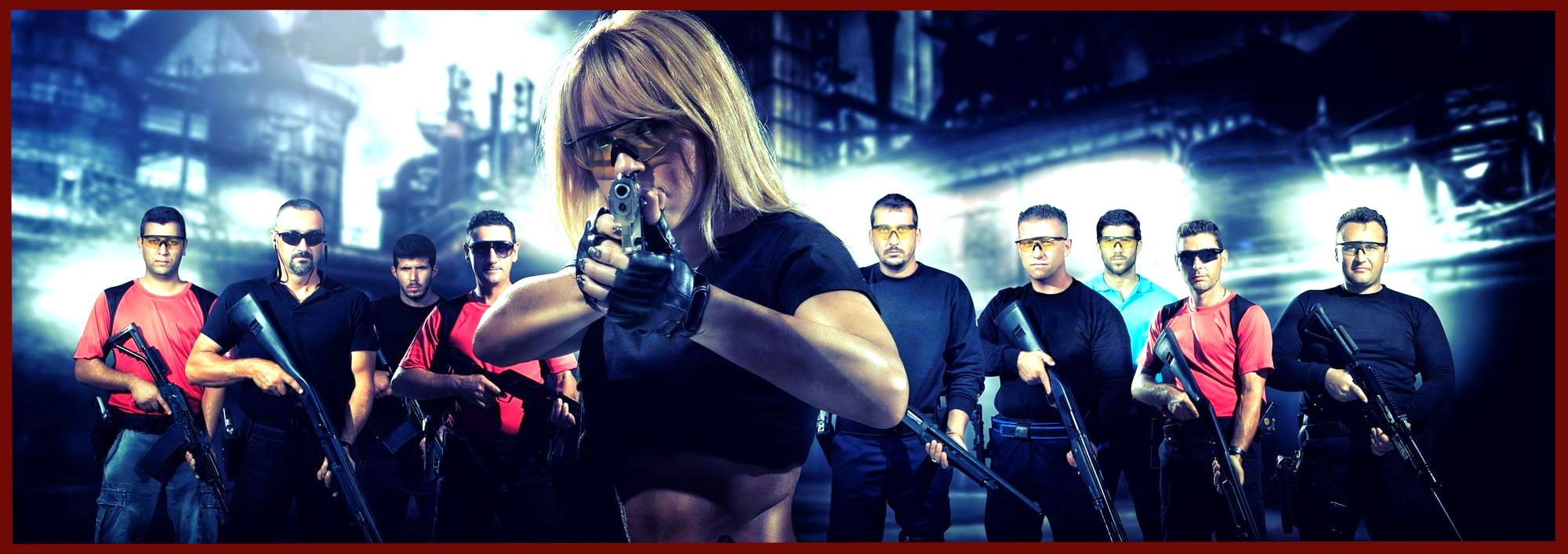
In Dominions of Darkness, there are three types of Hunters:
- The Survivor (can choose to select True Faith upon Character Creation)
- The Psivivor (a Gifted Human who becomes a Hunter)
- The Judge (can choose to select True Faith upon Character Creation)
(These Character Types are fully explained further down on this page)
Each has witnessed such heinous supernatural crimes against humanity that no amount of magic can erase it from their memories, as much as they wish it could. While attempting to grasp even the smallest threads of their blissfully-normal previous lives, they are consumed with finding new and better ways to face their very real demons.
In Dominions of Darkness, Hunters rely exclusively on the tools and abilities available to all humans. This includes building your skills in Brawl, Streetfighter Martial Arts, and Weapons Specialties.
However, due to their devotion to honing these skills to a fine edge, Hunters receive special bonuses that reflect their paramilitary training when purchasing their levels with XP. The only exception to this are the Judges, who progress in skill levels by learning new abilities.
Hunting the Supernatural Evil that Haunts Your Days and Nights
While there is no code regarding a Hunter stalking supernatural creatures on his/her/their own, this is a very risky venture to attempt solo. Hunters typically rely on the strength of their group, sometimes referred to as their Squad or Platoon.
A group of Hunters that acts without a plan, or that refuses to assume any kind of hierarchy, is doomed. Experienced groups of Hunters are extremely dangerous, and Kindred have a reason to fear them. Not only do seasoned vampire hunters have a good sense of what vampires can (and can’t) do, but they tend to have strategies under their belts that work.
Most important of all, though, knowledgeable Hunters know how to adapt, which is not something at which most Kindred excel. The trick, of course, is surviving long enough to become an experienced Hunter. Mortals are fragile. A single bite, broken bone, or gunshot wound can be enough to kill or cripple them, and a Hunter’s margin for error is very slim indeed. As such, before Hunters pick up a stake or a gun, they need to know what to do with their tools and have the will to see their plans through. Neither of these is a trivial matter.
First Contact with the Supernatural
A hunter’s “first contact” with the supernatural can take any number of forms. Many Hunters make the mistake of assuming that the creature they first encounter is indicative of vampires in general. If a mortal sees a Brujah flip a car and race down the block in the blink of an eye, that Hunter will probably assume all vampires are capable of this kind of physical prowess. If the Hunter spots a Nosferatu as he appears from the shadows and slaughters a homeless man, then she’s more likely to assume that vampires are, like this monster, hideous and unable to hide their condition.
Both assumptions are mistaken, and each is likely to prove fatal. Vampire Hunters have many different avenues of approach available to them if they try to learn more about the undead, but collecting solid, factual information is difficult. This isn’t because popular culture is wrong about vampires. The Kindred resemble the vampires of myth, legend, and cinema in many ways — they burn in sunlight, they exhibit enhanced strength and speed, they feed on blood, and they can shrug off bullets and many other forms of physical attack. The danger comes in assuming that any given observation applies to all vampires, because with a few exceptions, popular culture tends to treat vampires as a homogenous group.
Likewise, assuming that all literary or cultural vampire traits apply to any vampires is potentially fatal. Only a few works of literature group vampires by family or “Clan,” and even fewer speculate that different Clans might have different capabilities.
Generally speaking, Hunters are likely to learn about vampires (and, to a lesser extent, other supernatural creatures) through three methods:
- Popular culture
- Occult research
- Direct experience
- Instruction from more experienced Hunters in your group
All of these are valuable, and all have their pitfalls. As a Hunter, spend time doing your research, following up on unusual events and gathering as much information as you can. Being part of a group of Hunters makes this a great deal easier. And it never hurts to have someone watching your back.
NOTE: Remember to keep separate what your Character knows about Vampires and other supernatural creatures, and what You as the Player (the Person Behind the Keyboard) knows about them. It's easy to fall into the trap of Meta-Gaming, which is a Character who has knowledge that they could not possibly possess (such as knowing a person IS a vampire because you the Player read it in another player's profile, or knowing that Setites fear bright lights, when your Character would never have been exposed to that particularly rare tidbit of information.)
Recommended Reading
While not required, for those looking to learn more about playing a Hunter, the DOD Admins recommend reading: The Hunters Hunted II, Revised by White Wolf Publishing.
The content in this book is excellent for setting the stage to create an awesome Hunter character. However, any Mods, difficulty rolls or abilities regarding these characters are only valid through this Dominions of Darkness website.
HUNTER: THE SURVIVOR
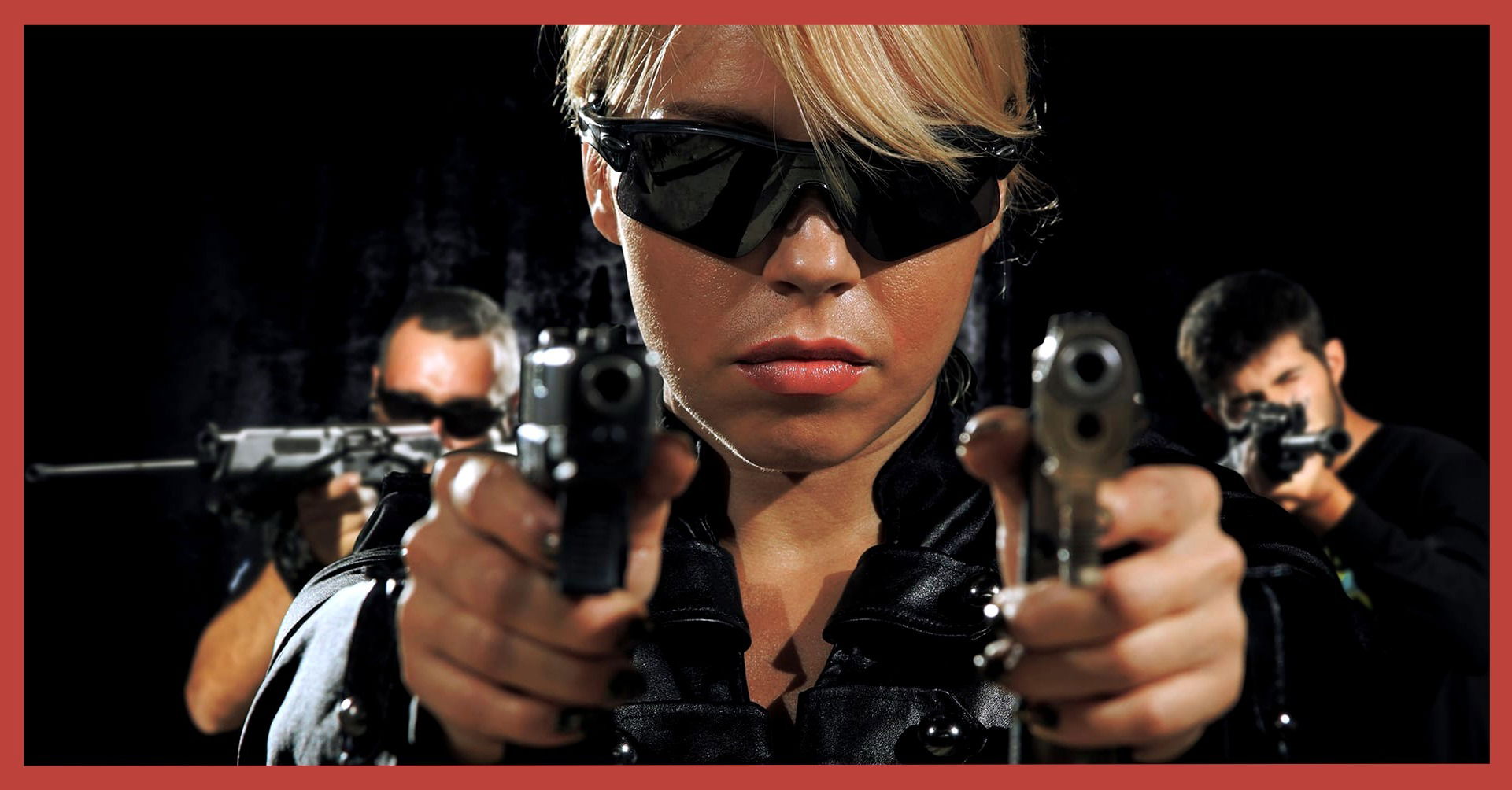
Born a normal, everyday human, this unfortunate victim has personally witnessed monsters savagely prey on humans. Whether they have seen an attack, or have been attacked themselves, the deed has been permanently imprinted on their souls. Detesting their own weaknesses and fears, they turn these emotions in on themselves, making frailty into strength and terror into courage. They deal with the constant knowledge of their own mortality by robbing the monsters of their own immortality. Just one more nightmare erased...one more bump in the night removed.
Once you've gained enough experience under your belt and become the most successful hunter in the history of vampire killing, don’t expect recognition. Despite all of your good works, no one’s handing out any medals.
If you approach someone, you may think you’re doing some great favor by removing the scales from the eyes of your fellow man. Don’t be surprised if the resistance you meet is much further beneath the skin, from traumatized survivor to sober witness. Your most trusted confidant can see the exact same thing you did and come away in unassailable denial. Try not to judge him for his weakness, even as you realize you can never be honest with him again. But that's just another reason why it's up to you to face the monsters and protect humanity from it's own ignorance.
◉◎◎◎◎: Hunter: Survivor - Witness (Buff)
- Cost: 60 XP
- DIF: 0
- Mod: Passive
- Special Notes: The Survivor can only actively recognize/hunt a Supernatural it has personally seen and knows about. This may be part of the Character's origin/backstory, or one that is seen during Roleplay. The way around this is to hunt with a group of people who already have knowledge of the monster. In this way you can learn and add to your portfolio of supernatural creatures.
- Permanent Affects:
- +2 Physical Attack
- +2 Physical Defense
- +5 Athletics/Reflexes
- +10 Initiative
◉◉◎◎◎: Hunter: Survivor - Beginner (Buff)
- Cost: 70 XP
- DIF: 0
- Mod: Passive
- Permanent Affects:
- +2 Mental Attack
- +2 Mental Defense
- +5 Athletics/Reflexes
- +10 Initiative
◉◉◉◎◎: Hunter: Survivor - Novice (Buff)
- Cost: 80 XP
- Mod: Passive
- Permanent Affects:
- +3 Physical Attack
- +3 Physical Defense
- +5 Athletics/Reflexes
- +10 Initiative
◉◉◉◉◎: Hunter: Survivor - Adept (Buff)
- Cost: 90 XP
- Mod: Passive
- Permanent Affects:
- +3 Mental Attack
- +3 Mental Defense
- +5 Athletics/Reflexes
- +10 Initiative
◉◉◉◉◉: Hunter: Survivor - Expert (Buff)
- Cost: 100 XP
- Mod: Passive
- Permanent Affects:
- +2 Physical Attack
- +2 Mental Attack
- +2 Physical Defense
- +2 Mental Defense
- +10 Athletics/Reflexes
- +10 Initiative
HUNTER: THE PSIVIVOR

NOTE: A Psivivor is "made" during roleplay and cannot be created as a start-up character during initial Character Generation. Psivivors must be approved by the Dominions of Darkness Admins before a Gifted Human can transition into a Psivivor Hunter. If a Gifted Human has In-Character reason to become a Psivivor, then the Psivivor abilities tree will be added to their Gifted Human's Character sheet by the Admins.
A Psivivor begins as a Gifted human, one who (during the course of Roleplay) has always been aware of the supernatural, but only recently of the creatures that were spawned within it. Not every Gifted Human that has witnessed supernatural creatures or events needs to become a Psivivor. However, it is a choice if the Gifted Human would like to join the Hunters, while still keeping and leveling up their chosen Numinas.
A Psivivor's realization that vampires, werewolves and other physical monsters actually exist is as horrifying and traumatic as it is for any other human who is suddenly "woke." It's no small surprise that many Psivivors, while not all, believe that using their gifts to eradicate these monsters is their life's mission, whether from Gaia, God, or some other powerful deity.
Because of their "awakening," Psivivors keep all their Gifted Human attributes, but are also able to sense the presence of ghosts as well as see them, whether or not they appear as a full apparition. There is no roll required for a Psivivor to see ghosts. If there is a ghost in the same room, they will see "something." What they see is up to the Storyteller.
In addition to keeping all their original Numinas and leveling them up with earned Experience Points (XP) during roleplay, the Psivivor opens up a plethora of bonus modifiers. The Psivivor experience tree will be opened up in the Gifted Human's Character Sheet. These new levels must also be purchased with Experience Points.
◉◎◎◎◎: Hunter: Psivivor - I See Ghosts! (Mental Skill)
- Cost: 60 XP
- DIF: 80
- Mod: Intuition, Mental Skill
- Special Notes: The newly-created Psivivor can always sense if ghosts or spirits are near. This is a new power that was awakened with the shock of knowing that supernatural creatures like Vampires and Werewolves actually do exist. No roll is required to "sense" ghosts. But to see, hear and communicate with these ghosts, the Psivivor can roll to make this attempt.
- Permanent Affects:
- +3 Mental Attack
- +3 Mental Defense
- +5 Athletics/Reflexes
- +10 Initiative
◉◉◎◎◎: Hunter: Psivivor 2 - Enhanced Ability
- Cost: 60 XP
- Mod: Passive
- Special Notes: The Psivivor may pick up a 3rd Numina of their choice and begin purchasing points in this new ability. Only Psivivors may have a max of four total Numinas.
- Permanent Affects:
- +2 Physical Attack
- +2 Physical Defense
- +5 Athletics/Reflexes
- +10 Initiative
◉◉◉◎◎: Hunter: Psivivor - Strength of Spirit (Buff)
- Cost: 80 XP
- Mod: Passive
- Permanent Affects:
- +3 Mental Attack
- +3 Mental Defense
- +5 Athletics/Reflexes
- +5 Initiative
◉◉◉◉◎: Hunter: Psivivor - Empowered Gift (Buff)
- Cost: 90 XP
- Mod: Passive
- Special Notes: The 4th Level Psivivor may pick up a 4th Numina of their choice and begin purchasing points in this new ability. Only Psivivors may have a max of four Numinas.
- Permanent Affects:
- +2 Physical Attack
- +2 Physical Defense
- +10 Athletics/Reflexes
- +10 Initiative
◉◉◉◉◉: Hunter: Psivivor - Powerplay (Buff)
- Cost: 100 XP
- Mod: Passive
- Permanent Affects:
- +2 Mental Attack
- +2 Physical Attack
- +2 Mental Defense
- +2 Physical Defense
- +10 Athletics/Reflexes
- +10 Initiative
HUNTER: THE JUDGE

Reading recommendation: Hunter Book: Judge, White Wolf
Judges are a non-combat Hunter focused on identifying, studying, researching and judging supernatural creatures. Oftentimes they are the leaders of Hunter groups, guiding through wisdom and justice. Their even tempers and the ability to take the emotion out of emotional situations help them guide their more violent, militant and impulsive colleagues who are more likely to mistake vengeance for justice.
A Judge's responsibility doesn’t involve just weighing the worth of creatures, people and hunters. Their execution of authority is much greater. Judges tend to be the information gatherers among the Hunters. Where fools rush in, they collect intelligence, observe patterns and search for weaknesses.
Above all, Judges seek to understand these monsters so they can determine whether they should live or die. A Judge may even look to identify those supernatural creatures who are not only benign in regards to humanity, but may be entreated, coerced, or threatened into working for the Hunters. In the Hunters' Group, Judges provide the critical intel on suspected supernatural beings, delivering justice to a world that is woefully short of it.
Judges believe that evil is a choice, not an affliction, and that evil creatures, both human and supernatural, should be punished accordingly. Their primary motive in the hunt is to punish supernatural creatures by meting out punishments other than death. Many judges question the instinctive reactions of their more direct colleagues and believe in doing what's right. Though killing supernatural creatures is not a crime in the Judge's book, they only look to punish the guilty. Often, Judges were decision-makers and leaders before the traumatic moment in their lives when they became a Hunter.
The Role of Judges
As a Judge, you decide the guilt or innocence of the supernatural, whether creatures commit atrocities against humanity or bear some glimmer of human decency and should be spared the gallows. You gather all the information you can about the creatures you observe — and from the allies you choose— but ultimately the decision to condemn, execute, punish or spare is yours.
It’s a terrible responsibility and one only you can bear. But what makes you tick? What consuming guilt, dangerous pride or extraordinary insight could make you the one to decide who’s worthy? But just as you need to better understand your own Judge, you must understand hunter society as it emerges; the two are inextricably intertwined. As each of the newly imbued struggles to understand their new world, origins and purpose, the Judge inevitably compares his/her/their experiences, philosophies and fears to those of others around them.
Passing Judgement
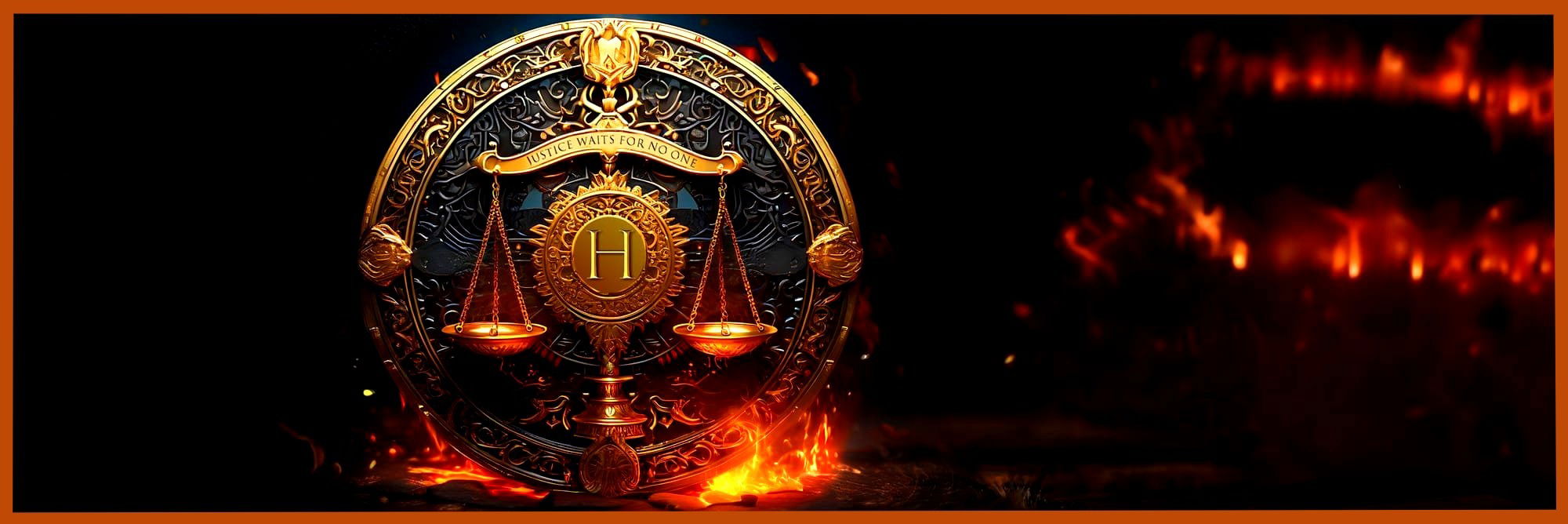
Judges bring their own unique perspectives to the hunt. They seek to perceive the relative worth of a creature (or a person or another hunter) in hopes of accomplishing the greatest possible good for the world — and so reclaim it in the name of propriety and decency.
If a being displays unremitting hatred or malice, an arbiter is quick to put it down or condemn it for others to dispatch. If a creature exhibits remorse for its actions or disdain for its corrupt state, it might be spared and perhaps even left for others to nurture back into the human fold. Such evaluation requires that Judges consider each subject individually, based on a mediator’s own sense of idealized right and wrong, good and evil.
Since Judges think in terms of the individual, they tend not to develop or use stereotypes or terms that apply to groups, or that subject single beings to preconceived notions. Judges therefore have not demonstrated slang or any list of hunting terms characteristic to them alone. Doing so would defy their purposes.
Keep in mind that Judges take great pains to avoid gross classification of creatures, people and even other imbued (they are the very embodiment of anti discrimination and the "Politically Correct"). You might even point out to characters of other creeds the dangers of such gross generalization.
It’s easy to call something a “monster” because it does not belong to nature, but mere classification of a being as supernatural is not sufficient for most Judges to sentence it to death. In fact, Judges are always on the lookout for bringing into the fold those supernatural beings that he/she/they deem worthy and who's skills and abilities would be an asset to their cause.
A judge delivers justice upon the supernatural, and justice waits for no one - man or monster.
◉◎◎◎◎◎: Hunter: Judge 1 - Second Sight (Buff)
- Base Roll: 40
- Energy Cost: 1
- Damage: 0
- Mods: Willpower, Mental Attack
- Resist: None
- Duration: Instant
- Permanent Affects:
- +5 Mental Attack
- +5 Mental Defense
- +5 Mental Skill
- +10 Athletics/Reflexes
- +10 Initiative
Description:
The Judge exhibits a hyper-alertness to supernatural creatures, allowing him/her/them to discern details about the creatures they're facing, such as the fact a being doesn't breathe or doesn't emit heat. They cannot be blinded of this ability, even if their eyes are closed, torn out or are if they are in utter darkness.
If a Judge knows about a particular supernatural creature, he/she/they will always be able to identify that type of being. Also, the Judge develops the ability to subsist on increasingly less sleep.
System:
The Player spends 1 point of Energy and makes a successful roll. The Judge can focus on one being and accurately discern if the Character is:
- Living or dead, has a pulse
- Breathing
- Giving off heat, room temp or colder/hotter than room temp
- Human or "something other"
- Is a specific type of being the Judge has personally seen or interacted with before and knows about
Judges do not require as much sleep at night as other humans, depending on their level:
- Level 1: Requires 5 hours of sleep
- Level 2: Requires 4 hours of sleep
- Level 3: Requires 3 hours of sleep
- Level 4: Requires 2 hours of sleep
- Level 5: Requires 1 hour of sleep
- Level 6: Requires 30 minutes of sleep
◉◉◎◎◎◎: Hunter: Judge 2 - Discern (Mental Skill)
- Base Roll: 60
- Energy Cost: 2
- Damage: 0
- Mods: Willpower, Mental Attack
- Resist: None
- Permanent Affects:
- +5 Athletics/Reflexes
- +10 Initiative
Description:
A Judge is skilled at making observations, allowing him/her/them to pick up on cues that others would fail to notice. A Judge only needs to speak with a supernatural being and ask it a specific question to know an important bit of information either about the being specifically, or about it's nature or weakness.
System:
The Player spends 2 points of Energy and makes a successful roll. The Target must then reveal one of the following, requested by the Judge asking the question:
- One of it's weaknesses. This can be a clan weakness, or a personal weakness.
- An aspect of its personality or history
- An admission of guilt or regret (if the monster is capable of such)
◉◉◉◎◎◎: Hunter: Judge 3 - Vow (Mental Attack)
- Base Roll: 80
- Energy Cost: 10
- Damage: 0
- Mods: Willpower, Mental Attack
- Resist: Willpower
- Permanent Affects:
- +3 Mental Attack
- +3 Mental Defense
- +3 Mental Skill
- +5 Athletics/Reflexes
- +5 Initiative
Description:
For those monsters who show promise and remorse regarding their crimes against humanity, a Judge may choose to impress a Vow on the supernatural being. A creature and a Judge verbally negotiate an agreement in which the being promises to forego a particular activity (such as leaving town or never attack another human, etc.). The Judge must solidify this pact by drawing, carving or burning the Judgment symbol on the creature to seal the pact. Even if the creature heals, the pact is still valid.
If the creature breaks the pact, the sign busts into flames causing 30 points of damage. Removing the symbol does not invalidate the contract. Only a Judge can absolve the monster of its pact and release it from its vow.
System:
The Player spends 10 points and makes a successful roll. If the Target fails to resist, then the being is forced to make whatever vow the Judge deems necessary to prevent it from preying on humanity.
The Judge must then imprint a symbol of the Vow (an image of the Scales of Justice) onto its body. This can be drawn, tattooed, carved or branded into its flesh. Even if the monster heals (like most Vampires would), the Vow is intact. If the monster breaks its vow, the symbol will burst into flames causing 30 points of damage. Plus, the Judge will know the instant the monster has broken its vow.
◉◉◉◉◎◎: Hunter: Judge 4 - Mental Shield (Mental Skill)
- Base Roll: 80
- Energy Cost: 10
- Damage: 0
- Mods: Willpower, Mental Defense
- Resist: None
- Permanent Affects:
- +10 Mental Defense
- +5 Mental Skill
- +5 Athletics/Reflexes
- +10 Initiative
- Temporary Bonus:
- +10 Mental Defense
Description:
The Judge has a natural ability to resist the mental influences of the supernatural beings he seeks to bring to justice. By focusing his Willpower, he can harden his resolve to resist all forms of mental attacks.
System:
The Player spends 10 points of Energy and makes a successful roll. For the duration of the scene, the Judge adds +10 to all Mental Defense rolls. This takes two full turns to complete. While it can be used during combat, it requires absolute focus where the Judge cannot attack or defend himself. If the Judge is attacked before the end of his second turn, his concentration is broken and he must spend another 10 points of Energy and another two turns to attempt to activate this ability.
◉◉◉◉◉◎: Hunter: Judge 5 - Burden (Physical Attack)
- Base Roll: 90
- Energy Cost: 15
- Damage: 0
- Mods: Willpower, Physical Attack
- Resist: Willpower, Physical Defense
- Permanent Affects: None
Description:
The Judge can temporarily imprison a supernatural creature briefly, fixing it to the ground where it stands (in some cases, “freezing it in the space it occupies” might be more accurate). While under the intense scrutinizing gaze of the Judge, the supernatural being is incapable of moving from the spot or escaping. This only works on supernatural creatures. This has no effect on humans, with the exception of Ghouls.
System:
The Player spends 15 points of Energy and makes a successful roll. If the Target fails to resist, he/she/they is held to the spot and cannot move more than a foot in any direction. This lasts for as long as the Judge holds the Target's gaze, or until the Target successfully resists this power. The Target may attempt to resist every three turns.
NOTE: The Storyteller decides whether multiple targets stand close enough together to all be captured in one look. If more than one Target falls under the Judge's influence, they all must roll to resist or be held to the spot.
The Judge must look at the thing and hold it in his/her/their gaze. Eye-to-eye contact is not required. Blinking is allowed, but looking away long enough to attack anything else or pay attention to anything else sets the creature free.
The entity can still act — speak, fight, use any powers it possesses — but it cannot move more than a foot from where it is. More than one creature can be burdened at one time, as long as they can all be seen simultaneously. Some creatures have capabilities that allow them to move into other realms or at superhuman speeds. These powers can sometimes be used to break free of Burden.
While burdening a creature, the Judge must keep his/her/their eyes on that being. He can attack it or otherwise interact with it, but attacking anything else frees the being. (And some ferocious attacks staged against the target itself may even break your character’s hold if he’s forced to look away at any point. The recoil from a shotgun, a blinding flair of light from an explosion for example, may cause a Judge to reflexively avert his/her/their eyes for a moment. The Storyteller decides when such a qualifying event occurs.
This ability does not work on human beings, not even victims of paranormal creatures. However, people who have been changed in some way by supernatural entities— given powers or unnatural gifts — can be targeted normally. Thus, a person possessed by a spirit can be liberated with this power if the spirit can be perceived and riveted to the spot. The host may simply be pulled away; the spirit passes through and the victim regains control of her body.
◉◉◉◉◉◉: Hunter: Judge 6 - Learn Numina (Mental Skill)
- Base Roll: 0
- Energy Cost: 0
- Damage: 0
- Mods: None
- Resist: None
- Permanent Affects:
- +10 Athletics/Reflexes
- +10 Initiative
Description:
At this level, the Judge has honed his mental abilities to a fine edge and is capable of learning one Numina of their choice.
System:
Purchase this Ability in your Character Sheet, then select any one of the Gifted Human Numinas and begin using XP to purchase levels in your new Ability.
For more information on Gifted Human Numinas, CLICK HERE.